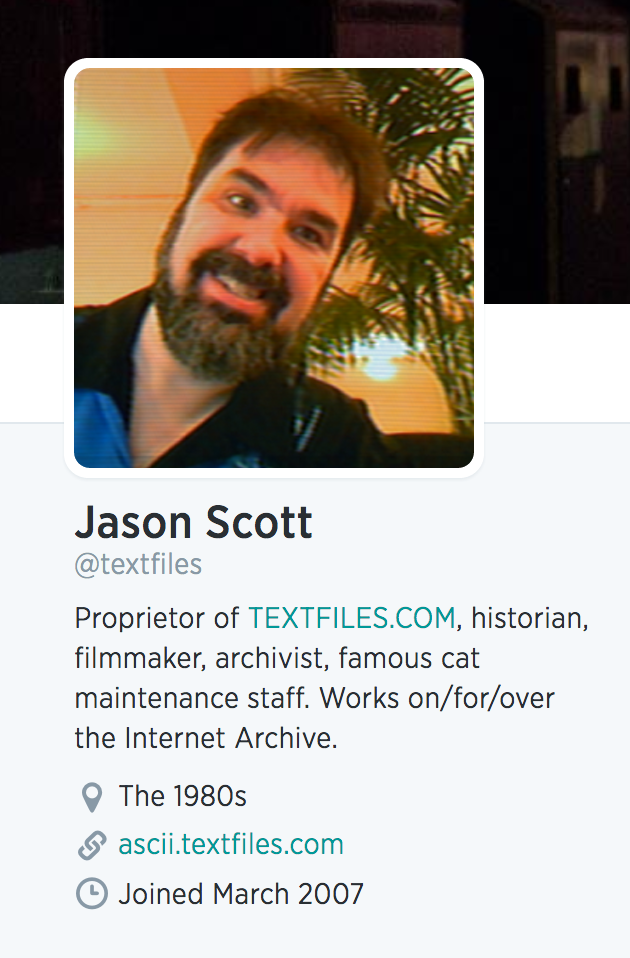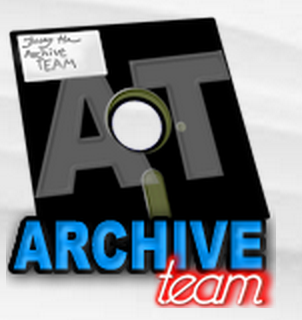 After seeing lots of interesting interactions on Twitter with @textfiles, otherwise known as Jason Scott, I was super excited to hear him present at the Web Archiving Roundtable. According to his Twitter profile, Jason is: “the proprietor of http://TEXTFILES.COM , historian, filmmaker, archivist, famous cat maintenance staff. He works on/for/over the Internet Archive.”
After seeing lots of interesting interactions on Twitter with @textfiles, otherwise known as Jason Scott, I was super excited to hear him present at the Web Archiving Roundtable. According to his Twitter profile, Jason is: “the proprietor of http://TEXTFILES.COM , historian, filmmaker, archivist, famous cat maintenance staff. He works on/for/over the Internet Archive.”
 One role Jason doesn’t mention in his Twitter bio is that he’s part of Archive Team, “a loose collective of rogue archivists, programmers, writers and loudmouths dedicated to saving our digital heritage.” This award-winning team has tasked itself with the responsibility of capturing websites that are in danger, usually because the service provider has indicated they will no longer host the site. Their most notable rescues include Geocities, Friendster, and Google Reader.
One role Jason doesn’t mention in his Twitter bio is that he’s part of Archive Team, “a loose collective of rogue archivists, programmers, writers and loudmouths dedicated to saving our digital heritage.” This award-winning team has tasked itself with the responsibility of capturing websites that are in danger, usually because the service provider has indicated they will no longer host the site. Their most notable rescues include Geocities, Friendster, and Google Reader.
Jason is a passionate, colorful speaker, but more importantly, the issues he addresses are vital ones the field of digital preservation and highlight ways in which the archival field has still not effectively dealt with the fast-paced nature of communication technologies, in this case, the web. His rants against brogrammer culture, while entertaining and perhaps alienating to some listeners, underscore the fact that free web services are essentially commercialist ventures and have no obligation to preserve the data they capture. What Jason and Archive Team have realized is that this data are not just random bits on a hard drive, but represent people’s lives: baby pictures, social networks, communities. When companies notify users that their data will be deleted, the average length of notification is 30 days. How many of those emails go unnoticed or unopened?

At first blush, the practices of Archive Team seem antithetical to traditional archival best practices: appraisal is minimal, content creators are not notified their data is being archived, and acquiring the data is more important than knowing what to do with it.

I would argue that all of these actually do happen quite regularly in archives: if appraisal weren’t minimal (or inherently subjective) we wouldn’t have discussions on reappraisal, un-notified content creators regularly appear in physical archives, and large collections of decaying A/V materials suggest that acquiring has always been the priority, even if we’re simply providing the final resting place for materials. If we adopt best practices in order to professionalize our services, and those best practices actually inhibit us from being as nimble as a volunteer group like Archive Team, then it seems there should be some discussion on what the profession is actually trying to actually achieve. I believe there’s much for us to learn in the model of Archive Team, which appears to function as a loose collective of passionate individuals, each familiar enough with different nooks and crannies of the web to raise the alarm when a site is in danger. How can we can build partnerships and networks with non-archivists who are archiving materials, rather than viewing them as rogue entities, or “citizen archivists?” I don’t have the answer for that question, and indeed, it’s really part of a larger dialogue, one that also includes issues related to documentation strategy and postcustodialism. Potential topic for #SAA15, anyone?